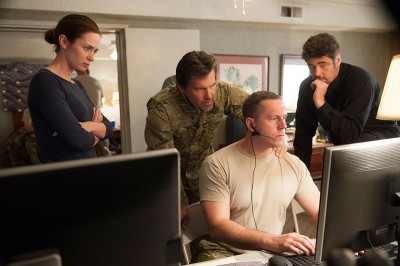Having spent last night partying Hollywood-style with the stars of Sicario, today started with an opportunity to see what all the fuss was about. In the lead role, as an FBI kidnap expert seconded to work with the CIA on bringing down a Mexican 
Next came another of those selected for the Un Certain Regard strand, Laurent Larivière’s I Am A Soldier. With this being the director’s first feature, it is also in the running for the Camera d’Or prize at the festival, which honours the best first film by a director across all the selections in Cannes, including the independent Critics’ Week and Directors’ Fortnight. I Am A Soldier comes hot on the heels of The Measure of Man, another film that begins with the struggles of someone who’s out of work – a sign, if ever there was one, that the recession in France is continuing to inspire the country’s film makers. This time round, you might think that the protagonist enlists in the army, but no – having lost her job in the city, thirty year old Sandrine, played by Louise Bourgoin, returns to her mother’s home in the country and starts working on her uncle’s dog-breeding farm. The film provides an unexpected insight into the world of dodgy dogs but has little of interest to say about the social issues it appears to be setting out to address. Jean-Hugues Anglade is perhaps the most interesting character, as the uncle, who is at first a cuddly Father Christmas kind of character, before being revealed to be a shady businessman of the highest order – Bourgoin herself, although the centre of the film and the audience’s guide through this world, has a more fragile and nuanced journey to portray and a subplot involving a romance seems somewhat misjudged.
After another fruitless half an hour queue in the sun, not to see another competition film, with the 1200 seats being filled by pink and blue badge holders, it was time for an early dinner, before rushing back for a repeat screening of the historical Taiwanese drama Nie Yinniang, or The Assassin. Coming to it later in the day made it harder to stay awake, slow as it was to tell a story, which seemed to require so much explanation that almost every character in every scene felt like they were reading chunks from a book. Beginning in 4-by-3 black-and-white and stopping off at grainy colour widescreen, it settles on crisp 4-by-3 colour. Visually gorgeous, the camera moves little enough for viewers to feel like they could be in a theatre – and apart from a shot of a goat’s backside, almost any frame would make a welcome piece of wall-art. But while the narrative was broadly coherent, despite the exposition, much was left unclear and the title of the film felt oddly inappropriate, since the eponymous Assassin – like most of the warriors on screen – seemed to walk on set, wave a knife around for a few seconds and then walk away again, essentially rewriting the definition of her job title. Some press walked out through boredom, but it’s necessary to keep an open mind when judging something so idiosyncratic and foreign to its audience in Cannes; there is a sense in which a western audience might just find it hard to connect to a very eastern style of story-telling and outside China and Taiwan, it might work better as a work of gallery video art.

